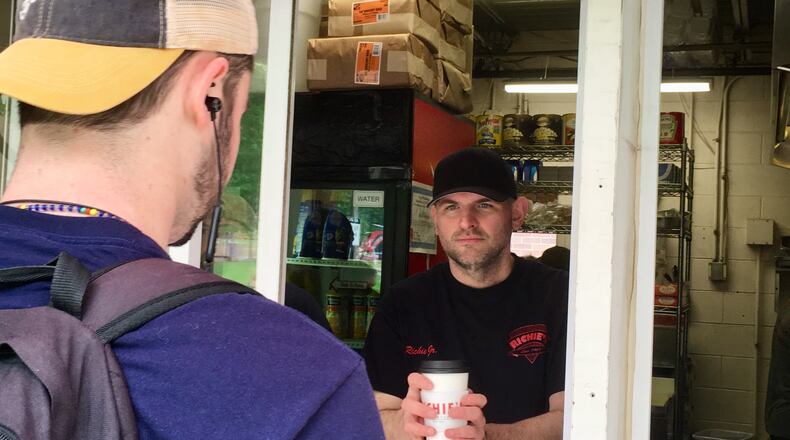Not long after Geoff Collins was hired as Temple head coach in December 2016, he invited James Jones come to speak to his team. Jones was no stranger to the Owls team — he was the campus police officer assigned to the team and had been for six years.
But something was different about this engagement. As Collins introduced Jones, he had a photo of him projected on a video screen with the initials “OOU,” which stood for “One Of Us,” a team slogan and a term that was “as high of an honor as you can get,” according to Collins.
Collins was the fourth Temple head coach with whom Jones had worked, but he was the first to make that sort of inclusive gesture to him. Jones likened it to the surprises often shared on social media when a college coach puts a walk-on on scholarship in front of the whole team.
“Well, that was my scholarship,” Jones said. “It meant a lot to me.”
When Collins was hired to return to Georgia Tech in December, he said that he and his wife, Jennifer, had left a job at Temple that they loved. In two years, they had become a part of the school community that apparently felt similarly about them.
“He treated us really nice, just really giving with everybody,” said Richie Juniors, owner of a popular campus eatery. “I never heard anyone say anything bad at all.”
The rapport that Jones and Collins built together extended far beyond Collins deeming the officer an OOU.
“He respected what I did,” Jones said. “He was 100% a supporter of me and the relationship that I had with the kids.”
Beyond that, there was a melding of extroverted, buoyant personalities.
» Also: Collins stood by close aide at Temple
“We hit it off because I guess we two are the same,” said Jones, 48. “Personable people, rather be happy than sad. Outgoing. We like people. And he’s just phenomenal. When he left, I was hurting.”
Jones was quickly impressed with Collins, from the intelligence he showed in his use of social media as a way to relate to players and recruits to his skill at motivating and developing players. Part of Jones’ approach with the team was to attend practice daily, and he noticed how Collins worked individually with players that were trying to get “above the line,” Collins’ term for being capable of contributing in games.
“And you saw players that he worked with rise and get to that point and were very appreciative of it,” Jones said. “Very, very appreciative of everything he did. And you just sit there and you smile and you’re happy for both sides.”
The team culture appealed to Jones so much that, although he had worked in law enforcement since 23, he contemplated changing his career path and pursuing a spot on Collins’ staff.
“That’s why I hurt so bad when he left,” Jones said. “Because I was like, I don’t know if I’ll get this again. Something that you want to be a part of and always (be) around, hands down.”
Informed recently of Jones’ idea to join his staff, Collins was surprised.
“That means a lot because I consider us to have a lot of positivity and energy and all those things, and he is absolutely infectious when he’s around people and interacting with anyone,” Collins said.
Another in Collins’ sphere at Temple was Juniors, owner of Richie’s Deli and Pizza, which is a campus institution. (Juniors, whose Albanian-immigrant grandfather started the business in 1952, runs the sort of place that nostalgic alumni visit when they return to campus. Students rave about the iced coffee.) Juniors got to know Collins as he brought breakfast sandwiches to the football complex before the team’s morning practices and served him at his stand.
“He came here all the time,” said Juniors, giving an interview as he took orders. “He would be all dressed up in a suit and he would just walk up. No one even would know or recognize him.”
Collins asked about Juniors’ employees, gave him sideline passes and once even had him give a talk to the team before a practice. In 12 years of supplying meals to the team, “that was the first time a coach ever invited me to do that,” Juniors said. “That was really, really cool.”
Collins said the gestures stem from the example of his late grandfather, Marvin Phillips (Collins called him Boop).
“My granddad always said it’s never a bad time to make somebody feel good about themselves, so I try to go through every day trying to make sure that people know how much they’re valued,” Collins said.
A police officer and the vendor of the best iced coffee in north Philadelphia could well attest.
“I couldn’t do anything but wish him the best,” Jones said of Collins’ departure for Tech. “Good things happen to good people, and he falls right there.”
About the Author
Keep Reading
The Latest
Featured



